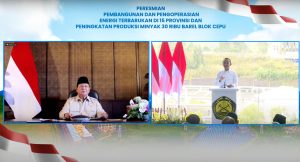Jakarta—Indonesia and Germany have once again strengthened their strategic partnership in addressing the global challenges of climate change and the biodiversity crisis. By launching 48 new projects supported by Indonesia’s International Climate Initiative (IKI), the two countries affirmed their commitment to collaborate to protect the environment and promote a sustainable energy transition.
In the Countdown to COP16 and COP29: Strengthening Indonesia-Germany Cooperation for Global Impact, Vivi Yulaswati, Deputy for Maritime Affairs and Natural Resources at the Ministry of National Development Planning (Bappenas), underlined the importance of this cooperation in facing the increasingly pressing challenges of climate change. She explained that the 48 projects launched aim to increase resilience to climate change, protect biodiversity, and strengthen energy transition efforts in Indonesia.
“This cooperation with Germany is very strategic because the programs implemented are not only aligned with the national priorities for the next five years but also strengthen Indonesia’s capacity to deal with major shocks that may occur in the future,” Vivi said in a written statement, Sunday, September 22.
She added that Indonesia emphasises the importance of international collaboration in dealing with the climate crisis and ensuring development sustainability.
In his remarks, Deputy German Ambassador to Indonesia Thomas Graf praised Indonesia’s steps to address climate change and protect biodiversity. He highlighted several of Indonesia’s initiatives, including the launch of the Indonesian Biodiversity Strategy and Action Plan and the Second Nationally Determined Contribution (NDC), which inspired other countries around the world.
“We appreciate Indonesia’s commitment to developing a concrete action plan to address the impacts of climate change and protect biodiversity,” Thomas said.
He said that cooperation between the two countries is important in the context of energy transition, in maintaining ecosystem resilience, and in strengthening community resilience. According to Thomas, this cooperation covers various sectors, including renewable energy, reducing greenhouse gas (GHG) emissions, and implementing sustainable land use practices.
“Energy transition and biodiversity protection must go hand in hand to ensure the sustainability of the environment and society,” he added.
Collaboration for global impact
Philipp Behrens, Head of the IKI Division of the German Federal Ministry for Economic Affairs and Climate Action (BMWK), said that cooperation with Indonesia reflects the major role Indonesia plays in various international climate agreements. According to Behrens, Indonesia is one of the most active countries in advancing the climate change agenda, especially in the areas of energy transition and industrial decarbonisation.
“Our top priority at BMWK is to drive the energy transition and support industrial decarbonisation. Indonesia plays a key role in various international climate agreements, and we are proud to continue working with the Indonesian government to achieve these goals,” Behrens said.
Since its inception in 2008, IKI has undertaken 134 bilateral, regional and global projects, covering various aspects of climate change and biodiversity conservation. In Indonesia, IKI operates through the Climate and Biodiversity Hub Indonesia, which GIZ Indonesia and ASEAN implemented with support from BMWK.
These projects involve close cooperation with the Ministry of National Development Planning/Bappenas and the Indonesian Ministry of Environment and Forestry (KLHK).
Through the newly launched projects, Indonesia and Germany seek to make a real impact on tackling climate change on a global scale. These projects cover a wide range of areas, from biodiversity protection to sustainable forest management to reducing carbon emissions in the energy sector.
“This cooperation is important not only for Indonesia and Germany but also for the world when facing the challenges of climate change. With these projects, we hope to drive significant changes in protecting the environment and adapting to climate change,” said Thomas Graf.
With strong support from the German government, Indonesia is optimistic that it can continue to play an important role in the global energy transition and protect biodiversity while strengthening environmental resilience amid climate change. (Hartatik)













